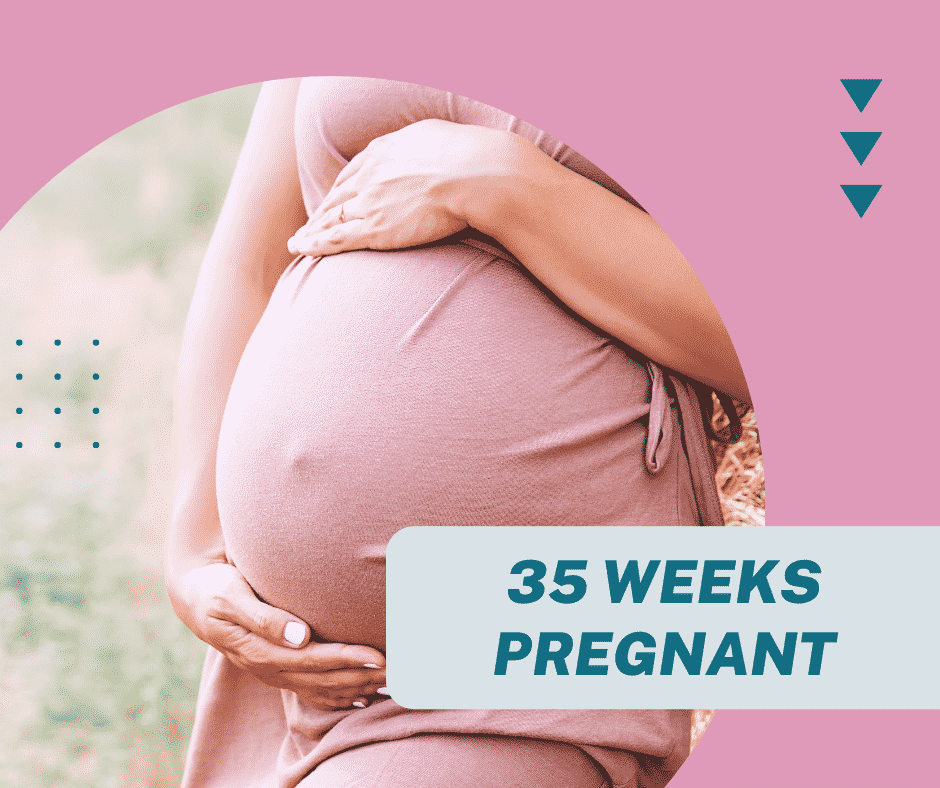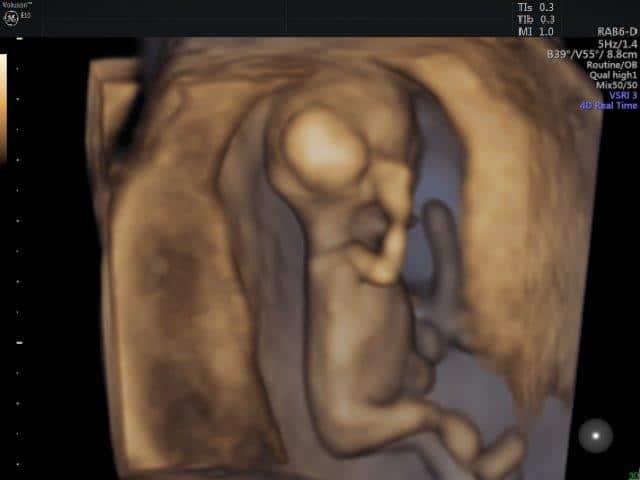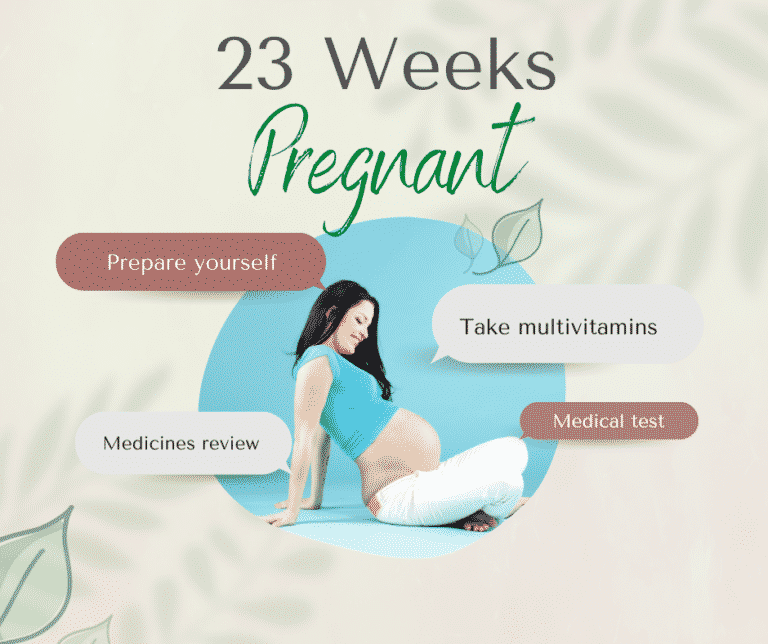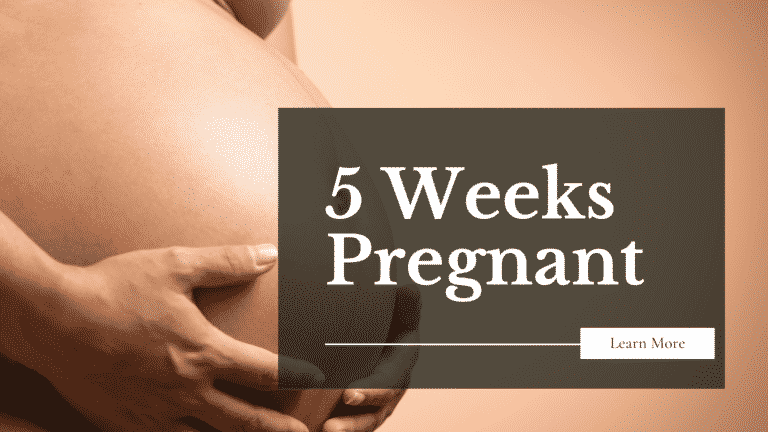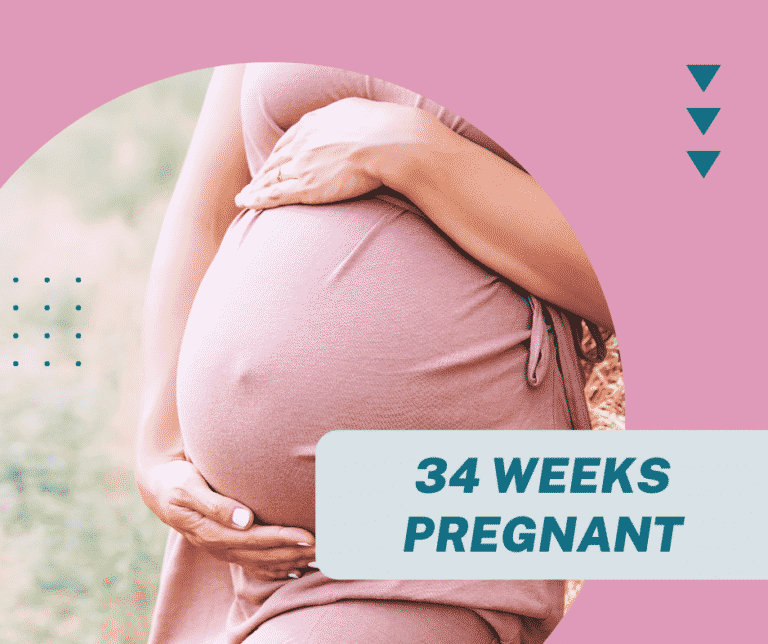35 Weeks Pregnant: Signs, Tips, Symptoms & Baby’s Development
Published on April 13, 2022 – Last Updated on October 23, 2022
At 35 weeks pregnant, you are in the home stretch of your pregnancy! Most women will receive delivery between 37 and 41 weeks. This week is a great time to start preparing for labor and delivery. You should also monitor your baby’s movements and take care of yourself.
This blog post can cover the symptoms and expectations of labor and delivery. Are you ready to dive in with us? Let’s get started!
What to expect during the 35th week of pregnancy
During the third trimester and week 35, you have to expect the following things:
You will experience more Braxton Hicks contractions. These are benign and normal uterine contractions that help the body prepare for childbirth. They may be more frequent and painful, but they are not dangerous and do not indicate that labor has begun. Read more about contractions: contraction timer, pregnancy contractions timer & how to time contractions.
Your skin will continue to stretch as your baby grows. You may notice stretch marks on your breasts, thighs, buttocks, or abdomen. These are permanent but will usually fade in time. The baby will continue to grow and gain weight. You may notice that you are gaining more weight as well. It is normal to gain about 1 pound per week during the third trimester before the baby arrives.
For detailed information about each pregnancy week please view our posts: due date by conception and stages of pregnancy week by week.
Week 35: Pregnancy Symptoms
By this point in your pregnancy, you’re probably feeling some discomfort. Here are a few common symptoms and pains of week 35:
- Fatigue.
- Shortness of breath.
- Frequent urination.
- Trouble sleeping.
- Heartburn.
- Swelling of the ankles, fingers, or face.
- Hemorrhoids.
- Low back pain with sciatica.
- Round ligament pain.
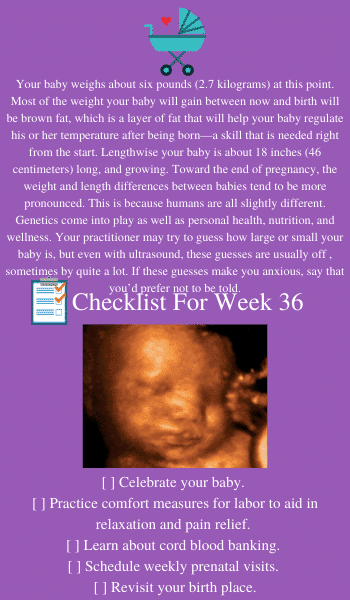
Fatigue:
You may feel exhausted all the time at 35 weeks pregnant. This is normal as your body works hard to support your growing baby. Get plenty of rest and eat healthy foods to help you cope with fatigue.
Shortness of breath:
You may find yourself short of breath due to the extra weight you carry around. This is normal and should improve after you give birth.
Frequent urination:
The increased pressure on your bladder may cause you to urinate more often. This is normal and will go away after you give birth.
Trouble sleeping:
It can be hard to get comfortable and fall asleep when 35 weeks pregnant. Try sleeping on your side with a pillow between your legs to help support your back and alleviate some discomfort.
Heartburn:
The increased pregnancy hormones in your body can cause heartburn or indigestion. Try eating smaller meals more often and avoid spicy or fatty foods. If the heartburn is severe, talk to your doctor about medication options.
Swelling:
The extra weight you are carrying can cause swelling in your ankles, fingers, or face. This is normal and should improve after you give birth.
Hemorrhoids:
The increased pressure on your blood vessels can cause hemorrhoids. These are swollen veins in your anus and rectum. Hemorrhoids can be painful, but they usually go away after you give birth.
Low back pain with sciatica:
The extra weight you are carrying can strain your back and cause low back pain. Sciatica is a condition that causes pain in your lower back that radiates down your leg. If the pain is severe, talk to your doctor about treatment options.
These are some of the common symptoms most pregnant women experience at 35 weeks pregnant; if you do not have any of the symptoms, don’t worry, and if you have any concerns, immediately discuss them with your doctor!
35 Weeks Fetus
The 35 weeks fetus is about the size of a cantaloupe and weighs around 3.5 pounds. Most of the bones are now formed, but they’re still soft and flexible. The 35 weeks fetus can now suck its thumb and swallow. You may be able to feel your baby move if you put your hand on your stomach. Your baby’s skin is reddish in color and is covered with vernix, a cheese-like substance that protects their skin from the amniotic fluid. The 35 weeks fetus continues to grow and develop and will be born soon!
35 Weeks Belly
Thirty-five weeks pregnant belly 35 weeks and showing no signs of slowing down. Thirty-five weeks pregnant and looking for a way to keep your energy levels up and your growing belly supported? 35 weeks pregnant is considered full-term, which means that you could go into labor at any time now. So how do you stay comfortable during these last few weeks of pregnancy? Here are some tips:
Wear comfortable, loose-fitting clothes. Invest in a good maternity support belt to help take the strain off your back and legs. Keep yourself hydrated by drinking plenty of water and avoiding caffeine. Get plenty of rest when you can, and take short walks to keep your circulation going. And finally, remember that every pregnancy is different – so don’t worry if you don’t look exactly like the 35-week pregnant bellies in magazines or on TV. Just focus on taking care of yourself and your baby, and you’ll be ready to meet your little one when the time comes.
Affirmations can help you ease the mental discomfort you may be feeling during the 35th week of pregnancy. Check out our collection in the following articles: positive pregnancy affirmations, birth affirmations, and hypnobirthing affirmations.
Baby’s Development: 35 Weeks Pregnant
Your baby’s arms and legs are getting chubbier due to baby fat, and their skin is becoming pinker. The baby is now considered full-term, so they are ready to be included in newborn babies! However, baby development is still in process, and you must take care of the baby’s health. Baby’s bones continue to harden, and their immune system continues to develop as before the baby’s arrival.
Baby’s Size:
Your baby is about the size of a Cantaloupe.
Baby’s Length:
His length is about 19.5-20.9 inches.
Baby’s Weight:
His weight is about 6.8-9 pounds.
Baby’s Growth:
Your baby grows about 1/2 an inch each week, and the baby structure is maturing.
Baby’s Kidney:
The baby’s kidney is now fully developed and functioning.
Baby’s Movements:
The baby should now be moving frequently. Contact your healthcare provider if you’re concerned about your baby’s movements.
Changes You experience in Your Body at 35 Weeks Pregnant:
Now a time you may experience different changes in your body like you start to gain more weight than before, difficulty breathing, your breasts become more significant, and your skin becomes more sensitive. You may also leak a little bit of urine when you cough or sneeze. These changes are regular and are your body’s way of preparing for labor and delivery. Let’s discuss then in detail:
You are likely gaining more weight now than at any other time during your pregnancy. By 35 weeks, you should have accumulated 25 to 35 pounds (11.3 to 15.9 kilograms). In addition, if you are carrying twins or multiples, you may have gained more weight.
Most of this weight is due to the growth of your baby. Your baby now weighs about 5 1/2 pounds (2.5 kilograms) and is about 18 inches (45.7 centimeters) long from head to toe.
You also carry more amniotic fluid, weighing about 2 pounds (0.9 kilograms). This fluid cushions and protects your baby during pregnancy.
The placenta, which provides oxygen and nutrients to your baby, weighs about 2 pounds (0.9 kilograms).
Your breasts may have grown by 1 or 2 cup sizes during pregnancy. This is because they are preparing to produce milk for your baby.
You may also notice that you have more energy than you did in the first and second trimesters. This extra energy can help you prepare for labor and delivery.
35 Weeks Pregnant: Tips for staying comfortable and preparing for labor
This week is a great time to start preparing for labor and delivery. You should also monitor your baby’s movements and take care of yourself.
Here are some tips for this week:
- Start preparing your hospital bag.
- Monitor your baby’s movements.
- Use your pregnancy pillow.
- Watch your water intake before bed.
- Eat more salads.
Start preparing your hospital bag.
You will want to have your hospital bag packed and ready to go by now. This way, you can relax and enjoy the last few weeks of your pregnancy, knowing that you are prepared.
Monitor your baby’s movements
You should be aware of your baby’s movement patterns by this point in your pregnancy. However, it is essential to continue to monitor your baby’s movements, as a decrease in movement can be a sign of distress.
Use your pregnancy pillow.
Your pregnancy pillow can help you to stay comfortable in bed at 35 weeks pregnant. It can also prop up your legs or back when you are sitting.
Watch your water intake before bed.
It is important to stay hydrated during pregnancy, but you may want to cut down on your water intake before bed so that you don’t have to get up to use the bathroom in the middle of the night.
Eat more salads
Eating more salads can help you get the nutrients you need while also taking a break from cooked meals. In addition, salads can be a light and refreshing option, especially in summer.
Tips For Partners in the 35th week of pregnancy:
If you’re the partner of a pregnant woman who is 35 weeks along, there are a few things you can do to help her out. First and foremost, make sure that she’s getting plenty of rest. Pregnancy can be exhausting, so she must take the time to relax and rejuvenate. Secondly, try to keep her stress levels low. Stress can negatively affect both mother and child, so it’s best to avoid it if possible. Finally, help out around the house as much as you can. Taking on some of the domestic duties will free up her time and energy to focus on her pregnancy.
Doctor’s Visit:
You have to make an appointment with the doctor during this week to get a checkup of your blood pressure, urine, etc., and know your baby’s position; you will also be asked about your weight gain and how you have been feeling lately.
If you are carrying twins or more, you will be given an ultrasound to check on the babies’ positions and sizes. Your doctor may also order a Non-Stress Test (NST) to check the baby’s heart rate.
At this stage, your doctor will also start discussing the birth plan and what to expect during labor and delivery. Again, if you have any questions or concerns, voice them out!
FAQs
Are you 35 weeks Heavily pregnant?
35 weeks is considered full term, so you are not considered heavily pregnant. However, you may feel more uncomfortable as your baby grows and puts pressure on your organs. You may also find it difficult to sleep, and you may be more prone to Braxton Hicks contractions. But, instead of some rare cases, you don’t see the upcoming baby or newborn baby this week!
What are the risks of being 35 weeks pregnant?
There are a few risks associated with being 35 weeks pregnant. These include preterm labor, placental abruption, and preeclampsia. If you experience any symptoms of these conditions, contact your healthcare provider immediately.
What should I expect at my 35-week prenatal visit?
At your 35-week prenatal visit, your healthcare provider will likely check your blood pressure, weight, and urine. They will also feel your abdomen to check your baby’s position and estimate their size. You may also have an ultrasound to check on your baby’s development.
Other Pregnancy Weeks:
- 1 Week Pregnant
- 2 Weeks Pregnant
- 3 Weeks Pregnant
- 4 Weeks Pregnant
- 5 Weeks Pregnant
- 6 Weeks Pregnant
- 7 Weeks Pregnant
- 8 Weeks Pregnant
- 9 Weeks Pregnant
- 10 Weeks Pregnant
- 11 Weeks Pregnant
- 12 Weeks Pregnant
- 13 Weeks Pregnant
- 14 Weeks Pregnant
- 15 Weeks Pregnant
- 16 Weeks Pregnant
- 17 Weeks Pregnant
- 18 Weeks Pregnant
- 19 Weeks Pregnant
- 20 Weeks Pregnant
- 21 Weeks Pregnant
- 22 Weeks Pregnant
- 23 Weeks Pregnant
- 24 Weeks Pregnant
- 25 Weeks Pregnant
- 26 Weeks Pregnant
- 27 Weeks Pregnant
- 28 Weeks Pregnant
- 29 Weeks Pregnant
- 30 Weeks Pregnant
- 31 Weeks Pregnant
- 32 Weeks Pregnant
- 33 Weeks Pregnant
- 34 Weeks Pregnant
- 36 Weeks Pregnant
- 37 Weeks Pregnant
- 38 Weeks Pregnant
- 39 Weeks Pregnant
- 40 Weeks Pregnant
- Birth Plan
- Baby Due Date Calculator
- EDD Calculation
- how many weeks pregnant I am

